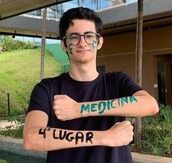EN 2018
Based on the text below, answer the next question.
Switzerland's invisible linguistic borders
There are four official Swiss languages: German, French, Italian and Romansh, an indigenous language with limited status that's similar to Latin and spoken today by only a handful of Swiss. A fifth language, English, is increasingly used to bridge the linguistic divide. In a recent survey by Pro Linguis, three quarters of those queried said they use English at least three times per week.
In polyglot Switzerland, even linguistic divisions are divided. People in the German-speaking cantons speak Swiss-German at home but leam standard German in school. The Italian spoken in the Ticino canton is peppered with words borrowed from German and French.
Language may not be destiny, but it does determine much more than the words we speak. Language drives culture, and culture drives life. In that sense, the Róstigraben is as much a cultural border as a linguistic one. Life on either side of the divide unfolds at a different pace, Bianchi explained. “[In my opinion] French speakers are more laid-back. A glass of white wine for lunch on a workday is still rather usual. German speakers have little sense of humour, and follow rules beyond the rigidity of the Japanese."
The cultural divide between I ltalian-speaking Switzerland and the rest of the country - a divide marked by the so-called Polentagraben - is even sharper. Italian- speakers are a distinct minority, accounting for only 8% of the population and living mostly in the far southern canton of Ticino. “When I first moved here, people told me, “Ticino is just like Italy except everything works", and I think that's true,” said Paulo Goncalves, a Brazilian academic who has been living in Ticino for the past decade.
Coming from a nation with one official spoken language, Goncalves marvels at how the Swiss juggle four. “It is quite remarkable how they manage to get along,” he said, recalling going to a conference attended by people who spoke French, German, Italian and English. “You had presentations being given in four different languages in the same conference hall.”
Living in such a multilingual environment “really reshapes how I see the world and imagine the possibilities,” Goncalves said. “I am a significantly different person than I was 10 years ago.”
Switzerland's languages are not evenly distributed. Of the country's 26 cantons, most - 17 - are German speaking, while four are French and one Italian. (Three cantons are bilingual and one, Grisons, trilingual.) A majority of Swiss, 63%, speak German as their first language.
(Abridged from http ://wmww.bbc.com)
According to the text, which option is correct?
English is spoken by one-fifth of the Swiss.
French speakers don't usually drink on workdays.
Germans are as rigid as the Japanese.
Everything works in Italy and in Ticino.
German is spoken by most Swiss citizens.
Tudo com nota TRI em tempo real



